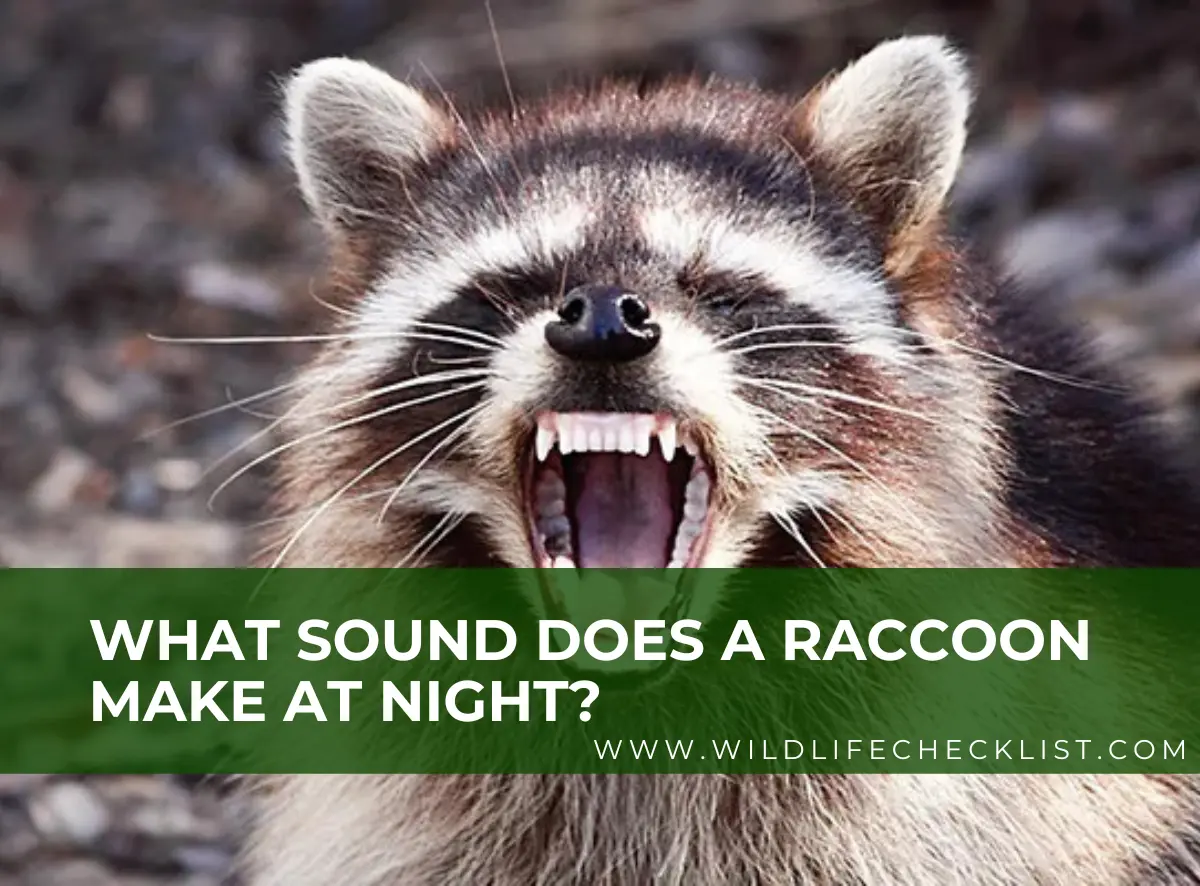What Sound Does A Raccoon Make At Night?

Raccoon sounds at night can often take homeowners by surprise. These nocturnal mammals can be very vocal at night, producing different distinctive noises as they go about their business.
Raccoon vocalizations heard during nighttime hours include chittering, a bird-like chirping they use to communicate with each other and their young; screeching, an alarming scream that signals distress or danger; and growling or hissing, aggressive sounds that warn intruders to stay away.
The eerie chittering, screeching, and other raccoon sounds are commonly produced as they interact with each other, defend their territory, or react to predators during their active nighttime hours. It is important to know how to identify raccoon sounds and what they mean, it will help you know what to do.
Have you ever been awakened in the dead of the night by alarming sounds coming from outside? Chances are, you were hearing the many sounds raccoons make. Raccoons are nocturnal mammals and they are always active at night. They produce different types of sounds that are mostly heard at night.
One common raccoon sound is chittering. This noise sounds like birds chirping and happens during mating season or when mother raccoons are communicating with their young.
Raccoon making chittering sounds consists of high-pitched vocalizations that sound like clucking, cooing, or chirping. These vocalizations are thought to be social, either for courtship during raccoon breeding season or contact between a mother raccoon and her kits.
Raccoons also frequently growl or hiss at night. Raccoons use these aggressive sounds to defend territories or resources. Growling and hissing serve as warnings to ward off intruders or threats. The growls can range from low rumbles to louder snarls depending on how threatened the raccoon feels.
One of the most alarming raccoon noises is screeching. If you hear what sounds like a person screaming outside at night, it’s likely a raccoon crying out in distress. Screeches mean that the raccoon is alarmed about potential danger. Some of the threats that can cause raccoons to screech include close encounters with predators or unfamiliar humans or pets.
So why do raccoons make so much noise at night? Nocturnal by nature, raccoons do most of their communicating and foraging under the cover of darkness. Learning to distinguish these signature nighttime raccoon sounds can alert you to their presence and behavior.
If the noises become frequent or concerning, calling a wildlife removal service is recommended. Otherwise, try to think of the raccoon sounds as your nighttime neighbors chatting away.
Contents
Main Raccoon Noises Heard at Night
Raccoons make different sounds, but they make some specific ones at night and below are some of the main noises raccoon sound at night.
1. Chittering: Raccoons make chattering or chittering sounds to communicate with each other. This chittering sound can sound like the birds are chirping. Raccoons often chatter when looking for food or interacting with other raccoons.
2. Screeching: When raccoons feel threatened or aggressive, they may make loud, screeching noises. These screeches can sound unsettling in the night as they reverberate.
3. Hissing: Like screeching, hissing is an aggressive vocalization raccoons make when feeling defensive. It’s a long, drawn-out hiss that signals a raccoon’s irritation.
4. Purring: Mother raccoons make soft, purring sounds to their kits. These purrs are similar to cats’ purrs but sound a bit raspy.
5. Crying: The crying or whimpering of young raccoon kits as they follow their mother, can be heard at night. They make these noises if separated from their mother.
6. Splashing: Since raccoons are excellent climbers who wash their food, you may hear splashing if they knock over trash cans or climb pools at night.
The most common night vocalizations to listen for are chittering, screeching, hissing, purring, and crying as raccoons communicate, search for food, and care for their young. Their nightly activities can result in other noises like splashing as well. To recognize these raccoon sounds at night, you will be able to know if raccoons are around your space at night.
When And Why Raccoons Make Noises At Night
The reason why raccoons produce sounds at night is a lifestyle they are good at whenever they want to communicate and show their behavior. These North American mammals primarily come to life during the night, displaying their greatest activity when darkness descends.
The actions displayed by raccoons are related to their hunt for food, mating, and social relationships. Raccoons use a variety of noises during times like barking, growling, snorting, screaming, whining, whistling, chattering, hissing, and purring.
The sounds raccoons do make are for different adaptional purposes. Certain sounds facilitate their interactions within their social circles, while others signify the demarcation of territories or the commencement of mating displays.
Moreover, raccoons might emit shrill screeches and squeals in moments of conflict or rivalry, typically stemming from their competition for resources or their efforts to establish dominance. Their nightly behavior is justified by a combination of practicality and evolutionary development.
The cover of night gives raccoons a defense against predators and simultaneously increases the effectiveness of their food-gathering activities. Their acute senses and remarkable adaptability render the night an optimal timeframe for their pursuits.
Raccoons vocalize during the night due to their innate nocturnal disposition and the array of communication demands they encounter during these hours. Raccoons’ noises indicate a variety of functions, which is from establishing boundaries to territories or coordinating mating exercise.
These activities often attain a heightened prominence during the night, coinciding with their escalated activity levels. This conduct is deeply entrenched within their evolutionary adjustments as creatures of the night.
Identifying The Location Of Raccoon Night Noises
Knowing the location from which raccoon sounds at night comes can be important if you’re trying to fight against raccoon infestation or to prevent them from causing damage to your property. Here are some steps to get the source of raccoon night noises:
1. Listen Carefully: spend some time outside during the evening when raccoons are most active. You can keep an ear out for sounds that raccoons might make, such as chattering, scratching, and rustling.
2. Use a Flashlight: Shine the flashlight around areas where you hear the sounds, such as trees, bushes, attics, or crawl spaces.
3. Check Trash and Food Sources: Raccoons are often attracted to areas with easily accessible food sources, such as trash cans or compost piles. If you suspect that raccoons do make noises near your trash, check the areas for signs of their presence.
4. Inspect Attics and Crawl Spaces: Raccoons sometimes seek shelter in attics, crawl spaces, or other secluded areas of buildings. If you suspect they might be inside your home, listen for noises coming from above or within walls.
5. Look out for Tracks and Droppings: Raccoon tracks and droppings can assist in knowing about their presence. Look for tracks in muddy or soft areas of your property, and check for droppings near potential den sites.
6. Set Up Motion-Activated Cameras: Installing motion-activated cameras in areas where you hear raccoon noises can help you visually confirm their presence and identify their activity patterns.
7. Consult Wildlife Experts: If you’re having trouble locating the source of raccoon noises or if you suspect a more extensive infestation, consider contacting local wildlife experts or pest control professionals.
8. Seal Entry Points: If you determine that raccoons are entering your home or structures, identify and seal potential entry points. More raccoon activity indoors will be reduced as a result.
What To Do About Frequent Raccoon Noises At Night
Constant raccoon sounds at night are often due to their nocturnal behavior. Raccoons will make different sounds at night. The noises from raccoons can also be a result of raccoons fighting each other majorly at night. What are the things you can do about raccoon noises at night? Follow the steps below.
1. Locate the Source: Determine if the noises are coming from your attic, garage area, or elsewhere. Raccoons are great scavengers and may be attracted to your ward when looking for food at night.
2. Secure your Trash bins: Ensure your trash cans are tightly sealed to prevent raccoons from scavenging for food.
3. Look out for Entry Points: Check your property for potential entry points, such as holes or gaps in the roof or walls. You can make use of materials like mesh or wire to cover up the areas and prevent raccoons from entering.
4. Install Motion-Activated Lights: These lights can deter raccoons from approaching your property at night.
5. Avoid leaving pet food outside: Don’t leave pet food or water bowls outside overnight, as they can attract raccoons.
6. Consult Professionals: If raccoons have entered your home or property, consider contacting a wildlife removal service to safely and humanely remove them.
7. Deterrence: Use repellents, noise machines, or even predator urine to discourage raccoons from frequenting your property.
Raccoons can be a carrier of diseases like rabies, which are known to be dangerous. Since you don’t know an infected raccoon, ensure you don’t move close to them.
How To Scare A Noisy Raccoon Away
Raccoons are known to have a keen sense of hearing, and they are naturally wary of loud or unfamiliar noises. Although it’s unclear which exact noises raccoons are most frightened of, some general noises may scare them away:
1. Loud Noises: Raccoons are nocturnal creatures, and sudden loud noises can startle them and cause them to flee. These include things like banging pots and pans together, clapping loudly, or setting off fireworks.
2. Predator Sounds: Raccoons have natural predators like owls, coyotes, and larger mammals. Playing recordings of predator calls or distress calls of other animals might make raccoons wary and keep them away.
3. Ultrasonic Devices: Some ultrasonic devices emit high-pitched sounds that are unpleasant for raccoons and other pests. These sounds are often beyond the range of human hearing, so they won’t bother you but might deter raccoons.
4. Radio or Music: Leaving a radio or playing music in the area where raccoons are causing problems could help to deter them, as the unfamiliar and continuous noise might make them feel uncomfortable.
5. Motion-Activated Devices: Devices that emit sudden bursts of noise, light, or water when they detect motion can startle raccoons and discourage them from approaching certain areas.
Raccoons are perceptive and flexible creatures, so keep in mind that they may later get used to some of the noises. It’s also crucial to always know that scaring raccoons away might not work in the long term.
To make your property less desirable to raccoons if they are causing issues on your property, it is a good idea to address the underlying attractants, such as food supplies and shelter. Speak with local wildlife experts or pest management specialists to get suggestions on human and efficient deterrent techniques if raccoons are starting to become a continuous annoyance.




